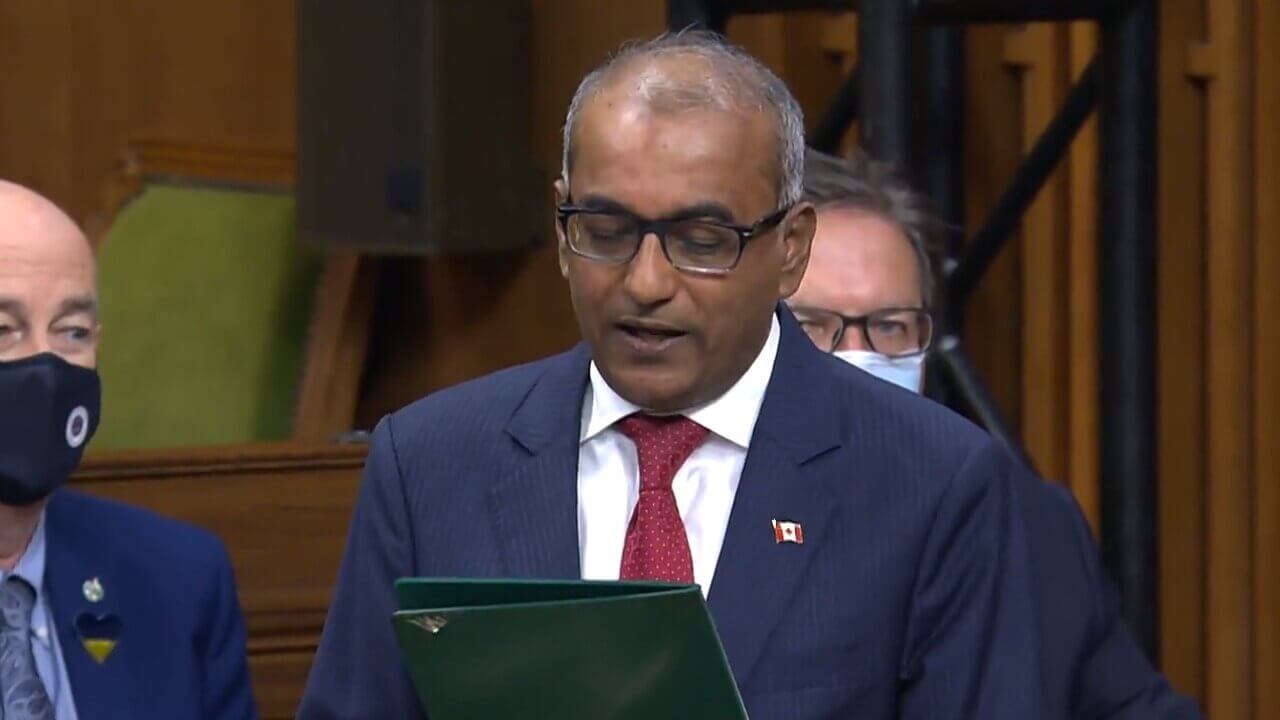Canada’s House of Commons last week passed a resolution to declare November as “Hindu Heritage Month” to celebrate the contribution of the Hindu community to the country’s socioeconomic development. The Senate will now debate the motion before it becomes a reality.
The motion was introduced by Liberal Party Member of Parliament (MP) Chandra Arya in May and had 14 joint seconders from other parties as well.
The motion urged the government to acknowledge the Hindu community’s contribution and services to Canadian society. It also seeks to celebrate the Hindu heritage’s richness and contribution to arts, science, astronomy, and medicine.
Celebrating the passing of the motion, Arya stressed that the support for the declaration from across the political spectrum was commendable, noting, “people with different political ideologies and people agnostic of any political ideology are all coming together in recognizing and promoting Hindu heritage in Canada.”
While introducing the motion in May, Chandra Arya celebrated the “extraordinary cultural, ethnic, and religious diversity” in Canada.
I hope this will motivate Hindu-Canadians to continue on their growth path in Canada and reach further higher levels in all spheres of Canadian society/life: economy or business; academic or culture; politics or philanthropy.
— Chandra Arya (@AryaCanada) September 28, 2022
The text of my closing remarks is attached.
2/2 pic.twitter.com/162lIQvlkY
He highlighted that there are currently over 600,000 Hindu Canadians that have arrived from India, Sri Lanka, Nepal, and other Asian, African, and Caribbean countries.
In addition, there are over 220,000 Indian students in Canada, most of whom are Hindus. Arya also highlighted the socioeconomic contribution of Hindu lawyers, scientists, doctors, business leaders, and elected officials.
Referring to a survey from May on the “faith journeys of Canadians across the religious spectrum,” he highlighted that Hindus “tend more towards being privately faithful and do not gather as formally and frequently.” Keeping this in mind, he stressed, “Hinduism is the only one to have positive views from Canadians in every religious group.”
My statement in Canadian parliament on the recent hate crime incidents on Hindu temples in Toronto. pic.twitter.com/QgbNxe9FEG
— Chandra Arya (@AryaCanada) September 20, 2022
Arya also celebrated the “ancient, robust, and magnificent” heritage of the Hindu community that has developed through its “unbroken 5000 years of history.” He remarked that Hindu heritage is both “alive and growing.”
Arya stressed that the Hindu community is “peaceful and productive” and positively contributes to the “multicultural fabric” of the country.
If passed, Hindu Heritage Month will add to the existing list of months dedicated to religious communities in Canada. For instance, April is dedicated to the Sikh community, May to the Jewish community, and October to the Islamic community.
We condemn the hate crime at the Shri Bhagvad Gita Park in Brampton. We urge Canadian authorities & @PeelPolice to investigate and take prompt action on the perpetrators @MEAIndia @cgivancouver @IndiainToronto pic.twitter.com/mIn4LAZA55
— India in Canada (@HCI_Ottawa) October 2, 2022
The motion comes amid ongoing tensions between Canada and India, which houses the world’s largest Hindu population.
Just a day before the motion was approved in the lower house, the Canadian Foreign Office released an advisory discouraging citizens from travelling to regions within 10 kilometres from India’s border with Pakistan in Punjab, Gujarat, and Rajasthan.
The advisory also warns against all travel to Jammu and Kashmir due to a “threat of terrorism, militancy, civil unrest and kidnapping” and Manipur and Assam over the risk of militancy and terrorism.
Meanwhile, the Indian High Commission in Canada has raised concern about the vandalisation of Shri Bhagavad Gita Park, which was recently renamed from Troyers Park to celebrate the contribution of the Hindu community.
Brampton Mayor Patrick Brown claimed that the sign had been changed for “maintenance and reprinting work” but nevertheless vowed to launch an investigation into the matter.
Update on Shri Bhagavad Gita Park from the @CityBrampton Parks Department. pic.twitter.com/8DqxDSfO0b
— Patrick Brown (@patrickbrownont) October 2, 2022
Previously, the Swaminarayan Mandir in Brampton was defaced with anti-India graffiti on 13 September by Canadian Khalistani extremists. Videos showed phrases like “Hindustan Murdabad” (Death to India) graffitied on the temple’s walls. The Indian High Commission condemned the incident and called for urgent action against the perpetrators.
Tensions between New Delhi and Ottawa further spiked last month after the Canadian government failed to prevent 100,000 Sikhs from participating in a vote in Brampton on 19 September to demand a referendum in Punjab on Khalistani independence.
The Indian government had formally reached out to the Canadian government at least three times to block the exercise. While the government in Ottawa extended support for India’s territorial integrity, it refused to take action against what it described as a peaceful exercise of democratic rights.

